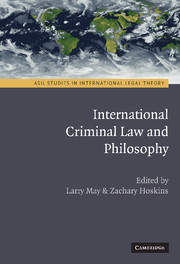Book contents
- Frontmatter
- Contents
- List of Contributors
- Introduction
- PART ONE SOVEREIGNTY AND UNIVERSAL JURISDICTION
- PART TWO CULTURE, GROUPS, AND CORPORATIONS
- 4 Criminalizing Culture
- 5 Identifying Groups in Genocide Cases
- 6 Prosecuting Corporations for International Crimes: The Role for Domestic Criminal Law
- PART THREE JUSTICE AND INTERNATIONAL CRIMINAL PROSECUTIONS
- PART FOUR PUNISHMENT AND RECONCILIATION
- Index
- References
4 - Criminalizing Culture
Published online by Cambridge University Press: 19 January 2010
- Frontmatter
- Contents
- List of Contributors
- Introduction
- PART ONE SOVEREIGNTY AND UNIVERSAL JURISDICTION
- PART TWO CULTURE, GROUPS, AND CORPORATIONS
- 4 Criminalizing Culture
- 5 Identifying Groups in Genocide Cases
- 6 Prosecuting Corporations for International Crimes: The Role for Domestic Criminal Law
- PART THREE JUSTICE AND INTERNATIONAL CRIMINAL PROSECUTIONS
- PART FOUR PUNISHMENT AND RECONCILIATION
- Index
- References
Summary
INTRODUCTION
Human rights are the ever-expanding paradigm of international law, and criminal law is the ever-burgeoning tool of that paradigm. As the body of international human rights treaties and conventions has expanded over the last two decades, more criminal laws have been enacted by governments in the name of human rights. I argue here that although the broad objectives of human rights and criminal law share some similarities, they also have important differences. Especially in the case of bodily harms committed in the name of culture, the reflexive use of domestic criminal law as a measure to improve human rights not only risks perverse effects, but also distracts attention from the actions of governments in instituting deep human rights improvements.
Criminal law was used in the Nuremberg and Tokyo military tribunals to punish perpetrators of World War II human rights atrocities. Fifty years after the Nuremberg Trials of perpetrators of the Nazi genocide and following the hiatus of the Cold War, a multiplicity of international courts and tribunals have consolidated the use of criminal law as a tool of redress for human rights violations in postconflict situations, sometimes in the name of “transitional justice,” sometimes in the name of “an end to impunity,” and sometimes simply in response to international activism.
Criminal law also has expanded into other human rights contexts. For example, more than half of the nation-states of Africa have adopted criminal legislation to sanction the practice of female genital cutting (FGC).
- Type
- Chapter
- Information
- International Criminal Law and Philosophy , pp. 75 - 90Publisher: Cambridge University PressPrint publication year: 2009



